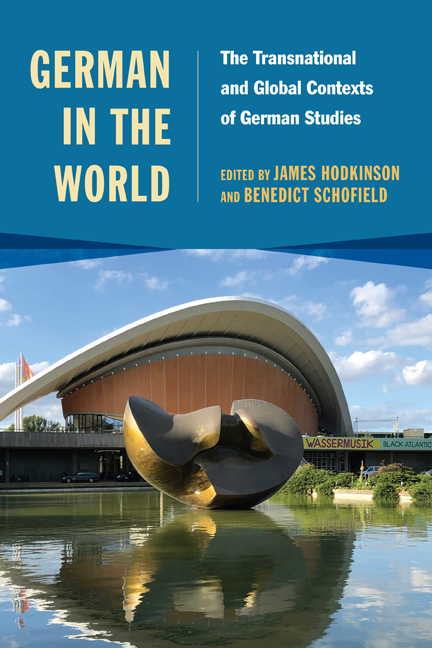8 - From German Studies to Environmental Humanities (and Back Again): A Journey across Continents and Disciplines
Published online by Cambridge University Press: 06 October 2020
Summary
IN HIS 2014 OVERVIEW of German environmental literary studies in the Oxford Handbook of Ecocriticism, the British Germanist and pioneering ecocritic Axel Goodbody notes that in the early years of the second decade of the new millennium, literary ecocriticism still remained relatively invisible in the German-speaking world, despite the comparative strength of environmental concern in Germany, Austria, and Switzerland. The German region has long been a leader in ecological science, politics, and philosophy, as well as a significant contributor to recent and current research in environmental history, theology, ethics, and aesthetics. Until recently, however, Germanistik (continental germanophone German studies) has been peculiarly resistant to ecocriticism. In part, Goodbody suggests, this could be related to the prominence of ecology and environmental thought in other fields. But he also observes that the core concerns of the kind of environmental literary studies that took off in the English-speaking world in the 1990s, foregrounding nature conservation, celebrating affective relations with place, and often deploying apocalyptic rhetoric, could have “seemed to skeptical academics [specifically, Germanists] a potentially dangerous throwback to Romantic and turn-ofthe- century forms of antimodernism” and irrationalism. Where ecocriticism had nonetheless found a small niche in the German academy was in English studies, or Anglistik, departments, primarily through the work of Americanists. The development of ecocritical Germanistik, meanwhile, was being undertaken by a geographically widely dispersed, and generally institutionally isolated, band of German studies scholars working outside germanophone territory. In addition to Goodbody and Colin Riordan in England, these included Jost Hermand, Heather Sullivan, Bernhard Malkmus, and Sabine Wilke in the United States, Serenella Iovino in Italy, and Nevzat Kaya in Turkey.
I also feature in this lineup of ecocritical scholars, and this chapter charts my own journey, at once intellectual and geographical, from Australian German studies into the inter- and transdisciplinary field of the environmental humanities as it emerged in Australia in the late 1990s and began to be institutionalized in Britain in the 2010s. This is, in part, a story of straying, testimony to my own inability to stay on the straight and narrow demarcated by disciplinary (and other) boundaries.
- Type
- Chapter
- Information
- German in the WorldThe Transnational and Global Contexts of German Studies, pp. 153 - 167Publisher: Boydell & BrewerPrint publication year: 2020



